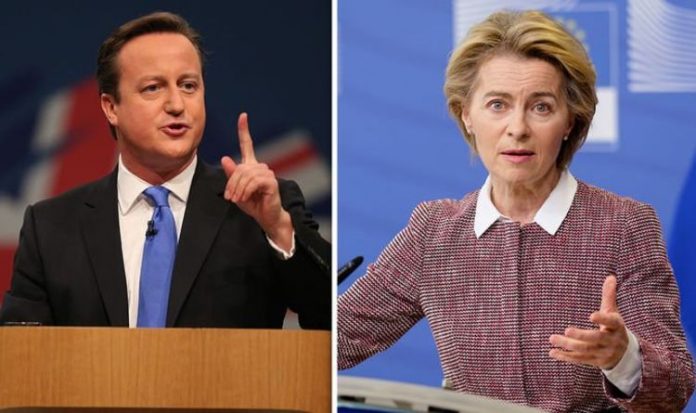Foreign aid: David Cameron says cuts are ‘breaking a promise’
Vaccines minister Nadhim Zahawi has urged Britons to keep faith with the AstraZeneca coronavirus jab, suggesting that an annual rollout of a booster will likely be required, with the first to come in the autumn. The EU caused a raucous after calling for the Oxford-produced vaccines to be diverted from the UK to member states to make up for their production shortfalls, despite France, Sweden, Germany and Italy snubbing UK health officials by recommending prioritising it for people younger than 65. Brussels faced global criticism when it moved to introduce controls on vaccine exports that threatened to tear-up the Brexit agreement after questioning whether AstraZeneca had previously shipped European-made doses to fulfil Britain’s order earlier this year.
But it is not the first time the bloc has faced a run-in with the UK and AstraZeneca.
The company’s recent vaccine success comes seven years after AstraZeneca rejected a £65billion takeover bid from Pfizer – a move which sparked fears over potential job losses in the UK.
Then Prime Minister David Cameron initially indicated that he would not interfere in the bid, but came under heavy political pressure to stand up for Britons.
Labour leader at the time, Ed Miliband, accused Mr Cameron of acting as a “cheerleader” for the US pharmaceutical firm Pfizer, calling for the brakes to be put on what would have been the biggest takeover in UK corporate history.
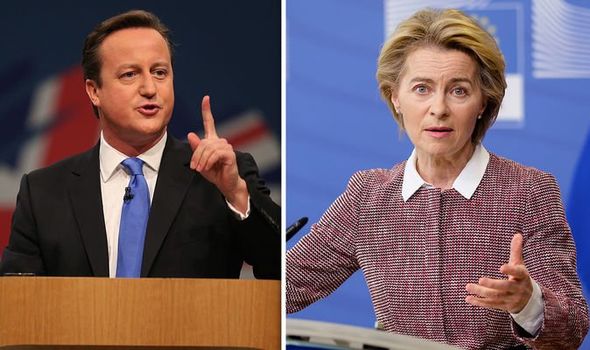
David Cameron was dubbed a ‘cheerleader’ at the time (Image: GETTY)
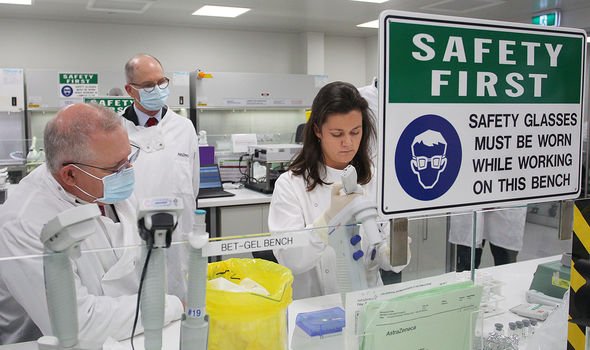
Questions have been raised over the AstraZeneca vaccines (Image: GETTY)
Mr Miliband wrote to Mr Cameron demanding a change in the UK law to ensure that a “public interest test” on such corporate deals should be applied.
He told the BBC’s Andrew Marr Show in 2014: “David Cameron is in totally the wrong place on this issue.
“He has become a cheerleader for Pfizer’s takeover when instead he should be championing the long-term agenda for high-quality jobs in this country which AstraZeneca provides.
“The Prime Minister, rather than being that cheerleader for this takeover with paper-thin assurances, should be actually championing British jobs and a British success story that is AstraZeneca – investing in research and development, a crucial part of our science base.”
Number 10 responded at the time, stating that the Government was not “cheerleading” for Pfizer, and instead it was “fighting for British jobs and British science”.
READ MORE: UK tipped for ‘messy’ AstraZeneca bust-up in ‘violation of EU’s power’ to save vaccines
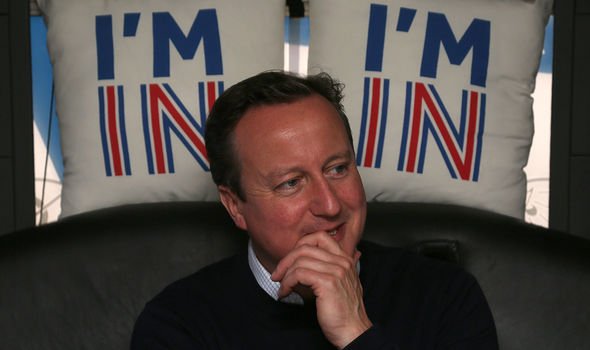
Mr Cameron came under ardent pressure (Image: GETTY)
Sources said the Prime Minister was neutral on the proposed deal, but Mr Cameron appeared to later U-turn and declared he wanted further commitments from Pfizer before giving his blessing to any takeover of Britain’s second-largest drugmaker at the time.
He did not rule out the possibility that the takeover would be subject to a “public interest test” – one of the few occasions when ministers can intervene – tabled by then Business Secretary Vince Cable.
That plan, however, reportedly had the potential to be overruled by the European Commission, as the UK was an EU member at the time.
Anthony Woolich, a competition partner at international commerce law firm, Holman Fenwick Willan LLP, said that it would be “very hard for the Government to intervene”.
He added: “The whole point about the European Commission is that where you have big mergers they should be regulated centrally and individual member states should not be able to intervene except on exceptional grounds.”
DON’T MISS
Tehran’s war capability revealed amid tensions with West [ANALYSIS
US soldier risked ‘cataclysmic outcome’ with defection to USSR [COMMENT
Turkey close to Russia’s grasp amid Trump fury after Venezuela ruling [ANALYSIS]

Coronavirus vaccinations LIVE (Image: DX)
Pfizer, who would have reportedly saved billions in taxes by shifting its domicile to Britain, had pledged to complete a new UK research centre, retain a factory and put a fifth of its research staff in the country if the deal went ahead.
But Westminster had become increasingly wary of British jobs being lost if the promise was not kept.
Under EU law at the time, takeovers were examined purely for the impact they would have on competition in the sector, and not on jobs.
The Enterprise Act allowed UK competition authorities to intervene in international takeovers but only in deals concerning national security, media plurality and financial stability issues.
To extend this “rare and extreme” measure to a pharmaceutical deal would have been seen as a “violation of Brussels’ powers,” according to experts, as the UK was still an EU member state at the time.
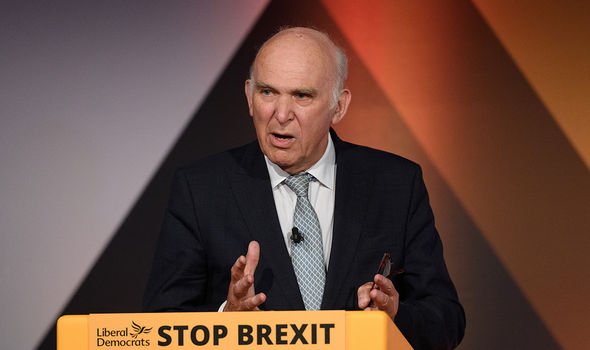
Vince Cable tabled an intervention (Image: GETTY)
Mr Cameron said he would do “what is right for Britain” should a formal bid from Pfizer be accepted, and Mr Cable said he would “not rule out intervention”.
But a number of European legal specialists claimed the chances of upholding a public interest defence in the case were slim.
Romano Subiotto, from law firm Cleary Gottlieb Steen & Hamilton, said: “Any political attempt to influence a Commission merger review will be rejected out of hand.
“There are clear rules surrounding this test and the pharmaceutical sector does not apply.”
The Government would have to prove its use of the public interest test would not prioritise British interests above other European member states.
Given political interest is focused upon safeguarding jobs and scientific facilities, this would run into difficulties.
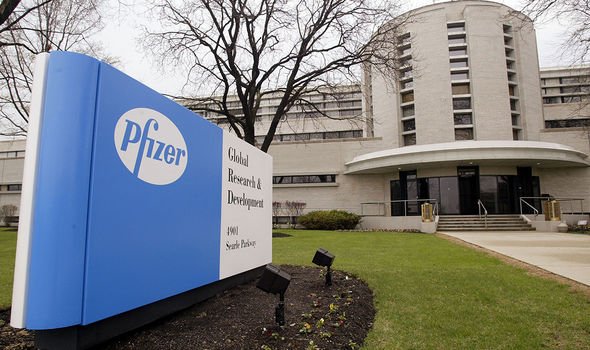
Pfizer proposed a bid to takeover AstraZeneca (Image: GETTY)
But Brussels-based lawyer Alec Burnside raised the possibility of the UK Government interpreting “public security” to include a protection of public health supplies.
This could have included the protection of vaccine manufacturing facilities in case of a pandemic.
He said in 2014: “There is some scope for manoeuvre to apply this, but it would be closely overseen by the Commission.”
But Mr Subiotto said this notion would be a “very high hurdle” to satisfy such a requirement.
In the end, however, AstraZeneca Chief Executive Pascal Soriot and his colleagues managed to fend off the £65billion bid, arguing it “fell short” of the company’s value.
Many of AstraZeneca’s most important, and lucrative, treatments are in the field of cancer.

The company is now in the spotlight for its vaccines (Image: GETTY)
But the company is now in the spotlight for its collaboration with the University of Oxford to develop a Covid-19 vaccine.
A study suggesting the vaccine offers “minimal protection” against the South Africa variant is not yet peer-reviewed but involved around 2,000 people who were on average 31 years old.
Leading Oxford scientist Professor Sarah Gilbert said the vaccine should still protect against severe disease.
She stated: “What that is looking like is that we may not be reducing the total number of cases but there’s still protection in that case against deaths, hospitalisations and severe disease.
“That’s really important for healthcare systems, even if we are having mild and asymptomatic infections, to prevent people from going into hospital with Covid would have a major effect.”
She added that developers were likely to have a modified Oxford jab by the autumn to combat the South Africa variant.
